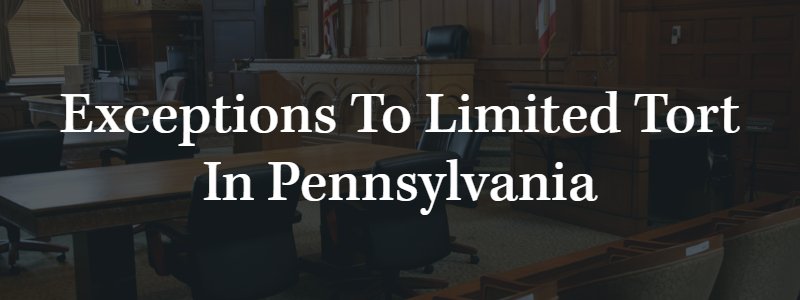Pennsylvania law regarding vehicle insurance and recovering compensation differs from how most other states across the country handle these issues. Most states operate under either a traditional fault-based system (called full-tort in Pennsylvania) or a no-fault system (called limited-tort in Pennsylvania). However, drivers in the Commonwealth are allowed to choose between the two types of insurance coverage, and the choice they make will significantly affect how their claims are handled.
When a driver chooses the limited-tort system in Pennsylvania, they are required to turn to their own insurance carrier to recover compensation for the medical bills and other losses regardless of who caused the accident. This has benefits as well as drawbacks. Drivers will not be able to recover compensation for pain and suffering damages caused by an accident when they use the limited-tort system, except in very specific circumstances.
Drivers who choose the no-fault system in Pennsylvania may be able to file a lawsuit against an at-fault driver in the event the injuries are considered severe. Typically, this means that the injuries have caused a person to lose some sort of physical or cognitive function.
If you or a loved one have been injured in an accident, talk to our Philadelphia car accident lawyers today for a free consultation. Our lawyers will answer all your questions and explain your legal rights.

Rule of exceptions to limited-tort
Not being able to file a lawsuit against a negligent driver for pain and suffering damages could result in a significant hindrance for victims in these cases. However, there are various exceptions to the limited-tort law in Pennsylvania. As mentioned above, any person whose injuries meet a certain threshold will still be able to file a lawsuit against the at-fault party for pain and suffering damages. In these cases, the injuries have to have resulted in a serious impairment to bodily or cognitive function. Additionally, drivers with limited-tort insurance can file lawsuits against the at-fault party:
- If the person who caused the accident was impaired by alcohol or drugs
- If the at-fault driver is from a different state
- If you are a passenger on a bus, taxi, truck, or other commercial vehicle when you are hurt
- If the at-fault driver intended to injure themselves or another person
PA law and choosing insurance
As we mentioned, drivers in Pennsylvania can choose between full- or limited-tort insurance. When making this choice, drivers often choose limited-tort insurance because it has cheaper premiums each month.
However, drivers need to think about whether this is the best option because sometimes the cheaper option could end up costing more in the long run. If these drivers get into an accident, limited-tort insurance laws in Pennsylvania significantly limit the ability of the injured driver to claim compensation for their full losses.
Drivers who use the full-tort insurance system in Pennsylvania are able to file a lawsuit against the at-fault driver for all losses they suffer, regardless of the severity of the incident. They do not have to worry about the exceptions listed above.
Car accident statistics in PA
According to the Pennsylvania Department of Transportation, there were more than 125,000 total crashes reported across the Commonwealth during the latest year of data. Out of these incidents, there were 1,059 total fatalities and more than 76,000 total injuries. Many of these injuries may not rise above the thresholds put in place in order to allow those who use limited-tort to file lawsuits to recover pain and suffering damages.